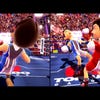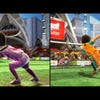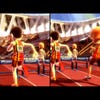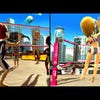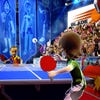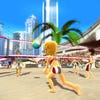Ex-Rare devs talk Killer Instinct, Perfect Dark
Starfire Studios recounts Rare's heyday.
It's a CV packed with best-selling games spread out across a decade: Killer Instinct, GoldenEye, Perfect Dark, Kameo… we're talking, of course, about Rare.
Independent UK developer Starfire Studios, which has just announced its first game, the Xbox Live Arcade twin stick hybrid Fusion: Genesis, is four men: artist Phil Dunne, programmer Mark Edmonds, artist Ross Bury and designer Chris Tilston. All worked at Rare during the famed studio's heyday, creating many of the games we grew up playing.
Then, in 2009, they left to go it alone. Here, in a sweeping interview with Eurogamer, Phil and Chris explain why, recount the glory days, discuss Killer Instinct, Perfect Dark, the switch to Kinect Sports, and more.
I am probably the most ancient, although not by age. That's Mark [Edmonds]. I started at Rare in 1993, worked on Donkey Kong Country for a little while as a programmer. And then the chance came to move on to Killer Instinct, which was just two people at that time: Kevin [Bayliss] and Mark [Betteridge]. I went on there as the designer. I went on to do Killer Instinct 2, then onto Perfect Dark 64, Perfect Dark Zero. Whereas Mark's first game was GoldenEye. He was the main programmer on GoldenEye, and he went on to lead Perfect Dark 64.
I started in 1994. The first game I ended up on was a baseball game, Ken Griffey, Jr.'s Winning Run, for SNES. That's how old I was. That was cool. I didn't have a clue about baseball at the time. Had no idea about the rules of the sport. Nobody in the company did. We were all like, how are we doing a baseball game? We did a lot of research and got brought over to Nintendo and got to see the Seattle Mariners play and meet Ken Griffey. That was really cool.
After that it was Donkey Kong Country 3 - I did a bunch of backgrounds on that. After that it was Killer Instinct 2. Then I ended up on what became Banjo Pilot in the end, which released on GameBoy Advance.
We were making it as Donkey Kong Pilot. We had the whole thing done. And then we got bought out by Microsoft and it was like, oh, we can't use Donkey Kong any more - right, let's do the whole thing again. And then it was on to Kameo. I spent a bunch of years on Kameo. Got that finally finished, out the door and then it was back to more prototypes and more unique projects. Then eventually I left.
Ross, the fourth member, he was on the Perfect Darks. He spent some time on Halo 3 - they sent a group of four or five artists there to help out because it was such a huge game. I think he did a bit on Banjo and the avatars. Ross is the youngest. He's the Ringo.
Yes. We'd seen all the tech and we'd been involved in all the prototypes. So we saw all that in its infancy. We were involved in some of that. But when Kinect Sports itself started as a game, that started after we left.
Yeah. There were lots of things people haven't heard about which we probably can't talk about. That's when the switch was public. We were always looking at how can we do different things and looking at different technologies. But they decided to concentrate on X number of things. It just seemed like a good time to do something different.
Mark had left in December, even before they swapped over to Kinect. He was getting creative urges, I guess, to do something. I'd always worked closely with Mark on a couple of projects. I guess in a way we complimented each other. Mark's the intelligent one. I'm the bull in the China shop. Once you've worked with somebody over ten years you know their strengths and weaknesses.
I don't put myself on a pedestal. We're not rocket scientists and geniuses. We're creating something, and hopefully we're creating something we find is fun, and if you're really lucky a group of players out there find is fun. You're just lucky to be in that position. If you yourself were involved on the team you would contribute in some way to that team and it would help shape the game in a certain way. I'm not dressing that up in hocus-pocus and mysticism.
One of the great things about Rare was the opportunity we had to make all the different types of games and franchises. You might end up doing a shooter for a number of years and then after three or four years of shooter, shooter, shooter, it's like, right, what do we do next? Right, we'll do a racing game. Let's see how that goes for a while. Quite a lot of different games came out of the studio at that time. That was really good. I was very lucky to be able to do that. An awful lot of people, you hear the games they've worked on, it's like, football game, football game, football game, football game. As a developer that's got to get a bit tedious at some point.
It was a really good time. It was a lot of fun to work for Tim and Chris [Stamper]. They used to come round all the time and get stuck in, give you great ideas and feedback on what you were doing. It was really good.









